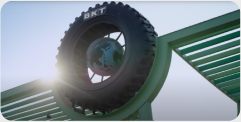Other useful tips that will help you keep your tires in good working condition for as long as possible.
Just as promised last week, we are back with a list of small, but useful tips that will help you keep your tires in good working condition for as long as possible.
Periodic checks
In addition to checking the air pressure, we also suggest periodical full tire inspections. Survey the tread and look for cuts, deformation or foreign objects (i.e. roots, debris, nails, etc.) that could puncture the tire. Check the state of the shoulder to see if there are any signs of wear or damage. Lastly, have a look at the rims. Check the contact points between rim and tire, and make sure the rim is not damaged. This could be a sign that your tire(s) were mounted incorrectly.
If you should find any traces of the aforementioned items, we suggest consulting a tire expert in order to have the underlying problem evaluated, and most of all, possible solutions to resolving the issue.
Holes are red flags – as soon as you see one, stop using your vehicle, remove the tire and replace it a.s.a.p.! Never use a deflated or damaged tire, as it could compromise the rim and/or the frame of your vehicle.

Watch out for external agents
“External agents" that might damage your tires are not only debris, roots or nails you typically encounter on your way, but are all substances with which tires come in contact.
Did you know that the weather - sun, rain, snow, hail - contributes to the wear and tear of your tires? It goes without saying that your tractor is regularly exposed to the elements, and so are tires. For this reason, we recommend parking your tractor in a closed space or covered area when not in use. Protecting your vehicle from rain and temperature changes will do wonders, not only for your tractor, but for your tires as well.
Finally, remember that chemical agents and plant protection products used in agriculture take their toll on tires. In fact, rubber absorbing chemical substances can cause serious damage to your tires in a short amount of time. Cleaning your tires after working in fields where fertilizers are used will help wash away chemical residues that could alter or break down your tires’ compound.
Now that you know these pointers, taking care of your tires will be a breeze. Try these methods out and let us know if they work for you!





